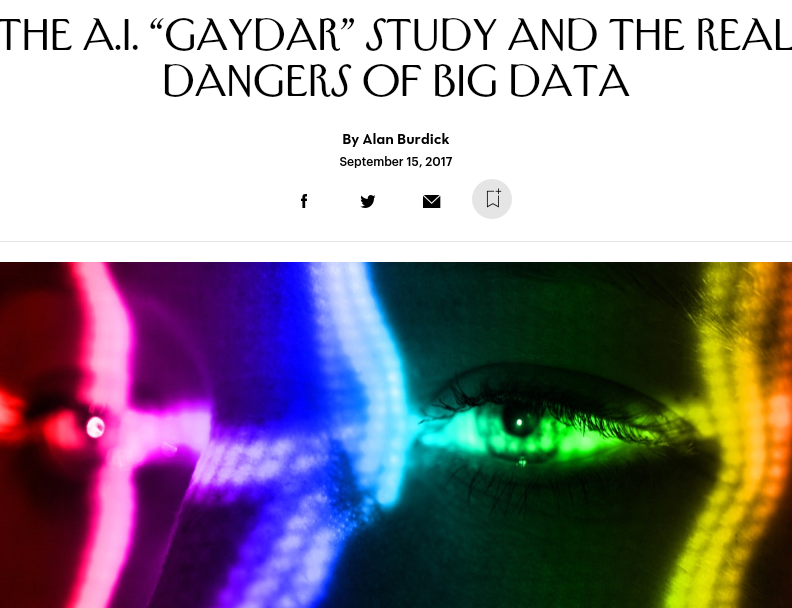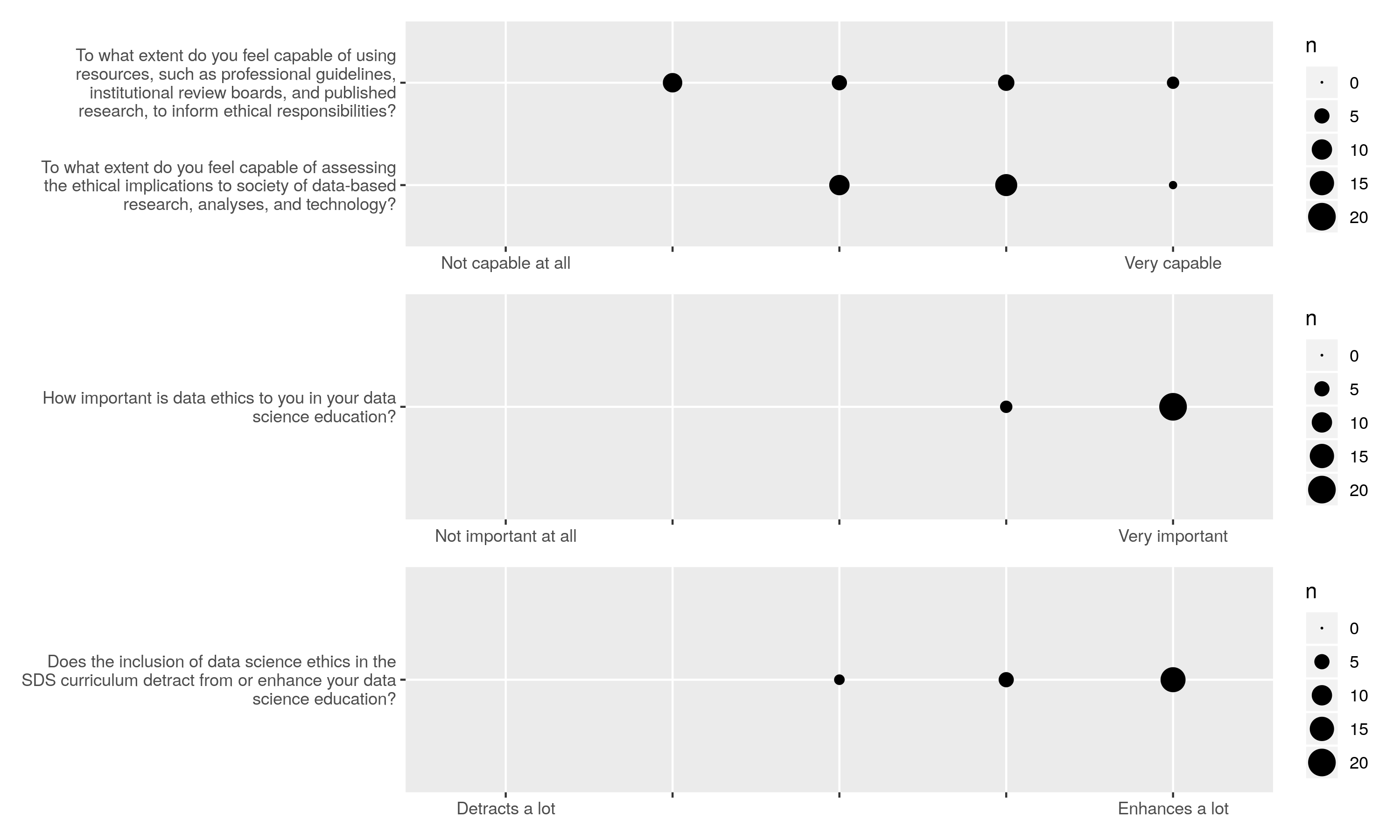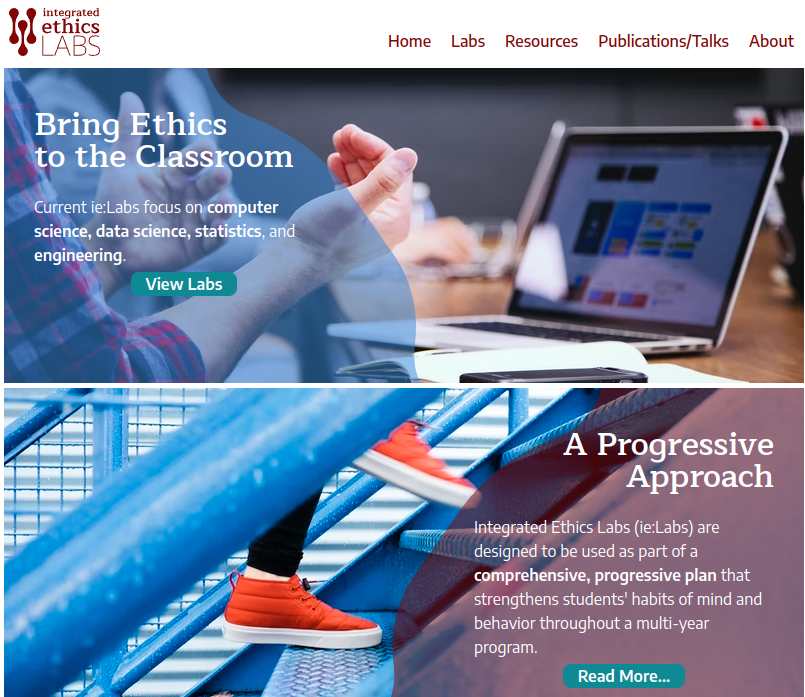| Topic | Categories | Bloom |
|---|---|---|
| OkCupid | data | Application |
| StitchFix | algorithms | Application |
| Grey’s Anatomy | practices, data | Application |
| Copywriting music | practices | Evaluation |
| Coding race | practices, data | Synthesis |
| Weapons of Math Destruction | practices, algorithms | Evaluation |
Integrating Data Science Ethics Into an Undergraduate Major
A Case Study
Benjamin S. Baumer and Katherine M. Kinnaird
Statistical & Data Sciences
Smith College
“The potential consequences of the ethical implications of data science cannot be overstated.”
— National Academies of Sciences, Engineering, and Medicine (2018)
Why do we
need to teach
data science ethics?
“I’m just an engineer”
Researchers build AI to identify gang members. When asked about potential misuses, presenter (a computer scientist at Harvard) says "I'm just an engineer." 🤦🏿 ♂️🤦🏿 ♂️🤦🏿 ♂️https://t.co/NbKepiaG4Y pic.twitter.com/qp6f0okJ1g
— One Ring (doorbell) to surveil them all… (@hypervisible) March 4, 2018
Algorithms reflect the biases of their creators

A piece of data itself has no positive or negative moral value, but the way we manipulate it does. It’s hard to imagine a more contentious project than programing ethics into our algorithms; to do otherwise, however, and allow algorithms to monitor themselves, is to invite the quicksand of moral equivalence.
NAS report
National Academies of Sciences, Engineering, and Medicine (2018), Data science for undergraduates: opportunities and options
Ethics is a topic that, given the nature of data science, students should learn and practice throughout their education. Academic institutions should ensure that ethics is woven into the data science curriculum from the beginning and throughout.
The data science community should adopt a code of ethics; such a code should be affirmed by members of professional societies, included in professional development programs and curricula, and conveyed through educational programs. The code should be reevaluated often in light of new developments.
Enhancement, not distraction

Baumer, Garcia, Kim, Kinnaird, Ott, Integrating data science ethics into an undergraduate major: A case study
Data science ethics
≠
statistical ethics
Something old, something new…
Old ethical notions:
How to Lie with Statistics
The Belmont Report (human subjects research)
reproducibility and replicability
p-hacking
conflicts of interest
Newer ethical notions:
algorithmic bias
web scraping (ToS)
doxxing
de-identifying personal data
re-identifying personal data
Our take
These ethical areas are obviously informed by longstanding ethical principles, but are distinct in the way that computers, the Internet, and databases have transformed the way we live.
Baumer, Garcia, Kim, Kinnaird, Ott, Integrating data science ethics into an undergraduate major: A case study
What are the learning goals?
Latest SDS learning goal
Assess the ethical implications to society of data-based research, analyses, and technology in an informed manner.
Use resources, such as professional guidelines, institutional review boards, and published research, to inform ethical responsibilities.

What’s included?
Copywriting Music
Debate: Should there be an academic license for music data?
Before Class
- Students are assigned to a “side” and then prepare a position paper (3-5 pages, double spaced)
Beginning of Class
- Two groups split off and decide a strategy
During Class
- Debate is a timed back and forth set of arguments and rebuttals
- Break before closing arguments
More on debate
Growing divide between access and development in industrial/corporate research labs and that in academic environments.
What data access do you have working at somewhere like Spotify, Apple Music, or Pandora? How does that access compare and contrast to the access at a research university or at a small liberal arts college?
Discussion about how laws designed to protect sales and artists (i.e copyright) differ from protecting privacy (ie. HIPAA or FERPA), and how ethical considerations vary when laws dictate “right and wrong” as opposed to morality
Late-breaking changes
SDS 100: Reproducible Scientific Computing with Data
The practice of data science rests upon computing environments that foster responsible uses of data and reproducible scientific inquiries. This course develops students’ ability to engage in data science work using modern workflows, open-source tools, and ethical practices. Students will learn how to author a scientific report written in a lightweight markup language (e.g., markdown) that includes code (e.g., R), data, graphics, text, and other media. Students will also learn to reason about ethical practices in data science.
What resources are available?
Books


More Books


Videos
Movies

Conferences
On our way to registration at #Data4BlackLives ready to get this started! pic.twitter.com/xFU0yCt9zu
— Smith College SDS (@SmithCollegeSDS) January 11, 2019
Teaching materials
Codes of ethics

Read the paper!
THANK YOU!

